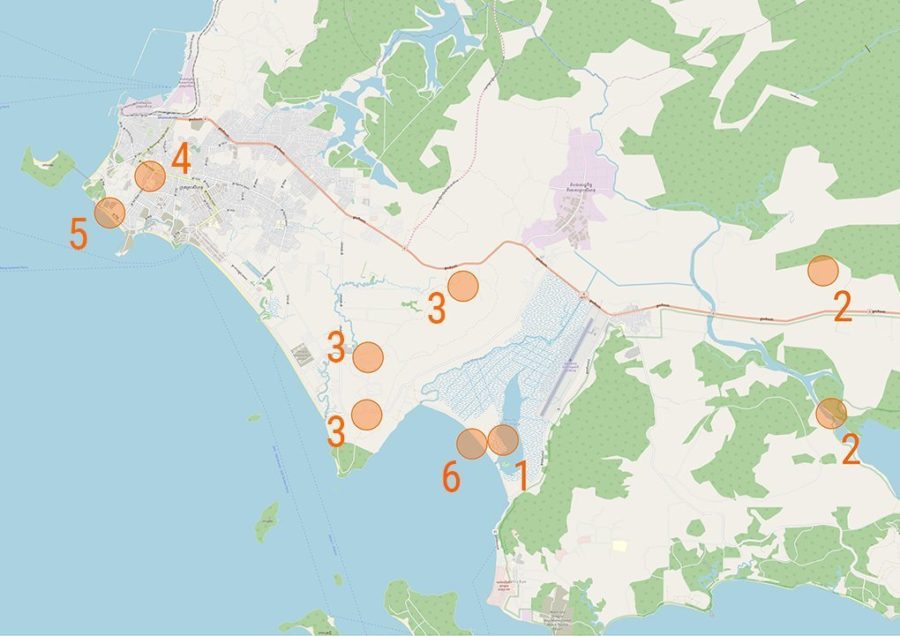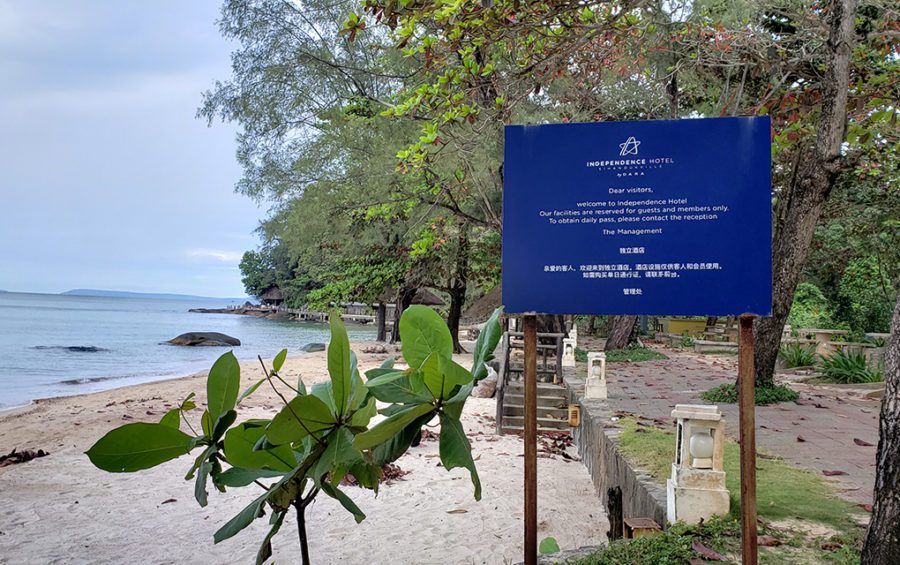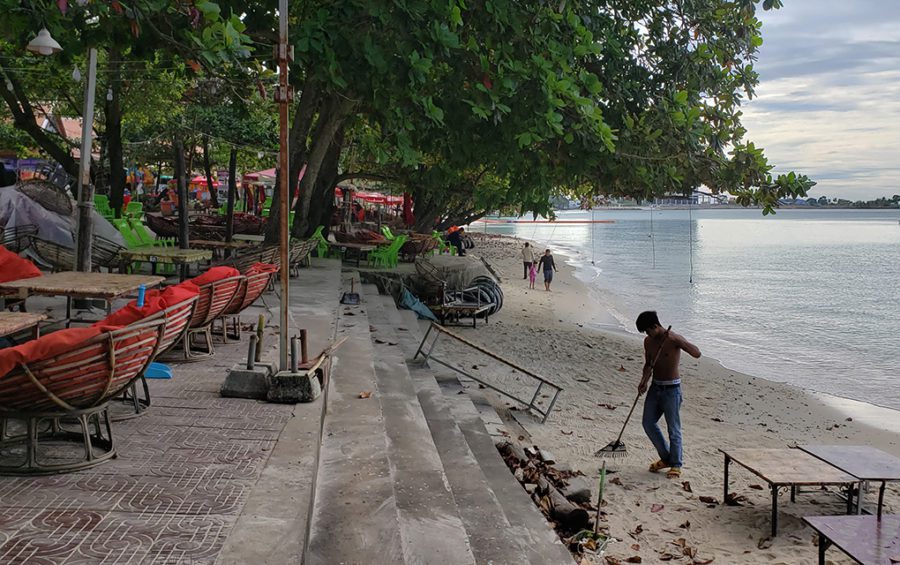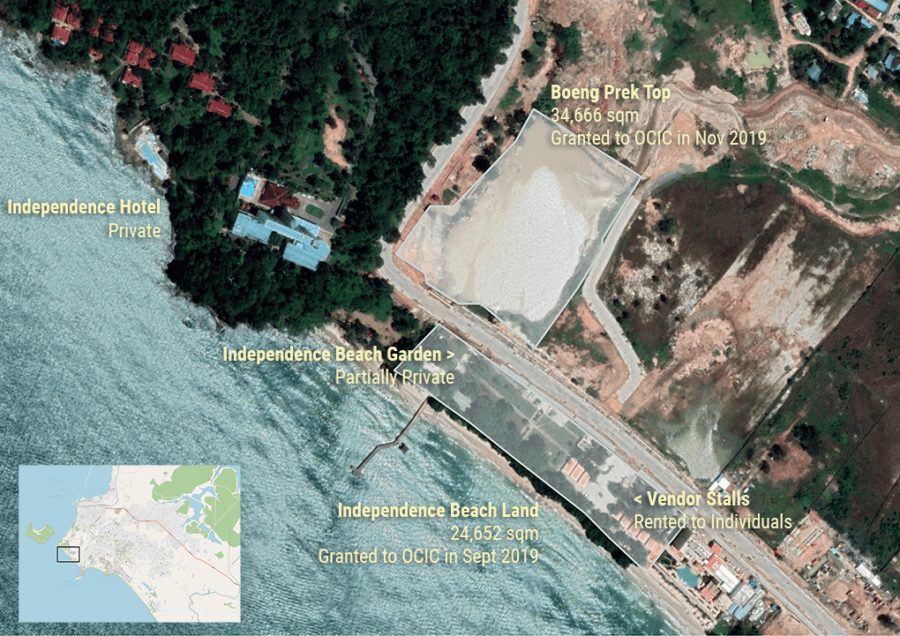SIHANOUKVILLE — If you encounter a guard, they will kick you out and take your wares, says Chhum Om, as she scrapes her small ceramic grill in preparation for another day trying to sell enough prawns and squid to keep up with rent payments.

- After Lake Gifted to Powerful Couple, Current Residents Face Upheaval
- Tracts of National Park, Disputed Area Privatized
- Villages Emptied Amid an Extensive Web of Elites’ Landholdings
- Sihanoukville Administrative Offices Moved, Freeing Lucrative Land
- Public Beach, Lake Made Private at Government Orders
- Prince-Linked Firm Pours Sand Into 400 Hectares of Bay Without Study
For now, Om, 50, sells grilled seafood from a vendors’ patio next to Independence Beach, where she crouches on the sidewalk in between the plastic chairs and tables of bigger shack restaurants. Guards recently stopped vendors from selling at the beach next to the nearby Sokha Hotel, and she has heard rumors that their stands in the shadow of Independence Hotel could also be banned.
“If they close here, we don’t know where to go,” she says. “Closing the beach is like closing the poor.”
One of Cambodia’s biggest conglomerates was handed some 6 hectares of beach and lake on prime Sihanoukville land after the company made a donation to the city’s road renovation. But the vendors at the beach argue that the now-privatized coast and wetlands still have public value.
Among a number of sub-decrees privatizing and gifting Preah Sihanouk province’s degraded forest land, the Overseas Cambodia Investment Corporation received a 24,652 square meter strip of beach in September 2019, after the government changed the state public area into private.
Two months later, the government privatized 34,666 square meters of Boeng Prek Tob lake, which faces Independence Hotel, and transferred it to OCIC.
Beachside land is worth roughly $2,500 to $3,000 per square meter, according to Ross Wheble, country director of real estate firm Knight Frank. The total value of the two plots could be as high as $178 million.
Under the Land Law, beaches and lakes are supposed to remain state land, as they’re deemed valuable to the public. However the November 2019 sub-decree hints at the government’s rationale for revoking public access, stating the land was given in exchange for OCIC’s donation to the state-led Sihanoukville road development project. Late last year, government spokesperson Phay Siphan explained that this was the government’s current strategy to make up for budgetary shortfalls.

Chaired by tycoon Pung Kheav Se, OCIC operates in close proximity to Prime Minister Hun Sen as well as prominent Chinese state and private companies. The company is responsible for some of the country’s most ambitious construction projects in the capital, including massive landfilling on two Mekong River islands, Koh Pich and Koh Norea, as well a new international airport and city spanning thousands of hectares in Kandal and Takeo provinces.
A project manager working with OCIC said he did not know about the company’s developments in Sihanoukville and would not refer reporters to another source. An assistant to Kheav Se did not respond to emailed questions. OCIC’s plans for the beach and lake land are unclear.
OCIC’s new coastal land is nestled between one of their existing properties, Independence Hotel, and a cluster of other extravagant hotels and casinos, including the Howard Johnson by Wyndham and an ongoing resort development by timber tycoon Try Pheap. Vendors and the public had access to the beach, shack restaurants and park in the past, but now only half of the park is open to the public.
The park’s tiled pathways don’t look significantly different from the street view captured by Google in 2014, though access is now limited at the corner next to Independence Hotel.
On a late morning in late November, families walk to the edge of the garden’s pier to look out onto the Gulf of Thailand, but a security guard stands to the right side of the pier, preventing visitors from walking toward a nearby gazebo unless they prove that they’re staying at the Independence Hotel.
The park, called Independence Beach Garden, is buttressed by signs thanking sponsors of Canadia Bank and the Cambodia Constructors Association — both pieces of the OCIC empire. Signs scattered throughout the patches of grass and palms claim only hotel guests and members are permitted to enjoy the area.
On a tiled square next to the garden, a half dozen tourist shacks are still selling food and drinks to tourists and Sihanoukville residents.

A vendor with a food stand and rows of rattan couches and tables says his family has operated a restaurant next to Independence Beach for four years. The family previously worked around Otres Beach, and was kicked out from selling seafood and drinks from another area near Sokha Beach several years before that. He says he has an 18-month contract to rent the stand through Canadia Bank, and the vendor does not want to give his name to protect his contract.
The rent started at about $1,000 per month, and rose to $2,000 when he re-signed in 2019, though the owner eased the rent during the pandemic, he says.
He says the contract lasts until June, but he doesn’t feel confident it will be renewed.
“We will figure out if we have a new contract or not,” he says. “We do not think they will continue the contract because the Chinese companies are coming.”
The area has changed dramatically, he explains, losing trees and a soccer pitch, which was close to the lake that was allocated to OCIC. He says he wishes the government would protect that lake and develop it so residents and tourists can visit it and appreciate Sihanoukville’s natural beauty — as a city official promised in 2018, according to the Phnom Penh Post.
“[The current development] has no benefit to the people, and I don’t think the money goes to the state either,” the vendor says. “We are very upset because we have very beautiful beaches.”












